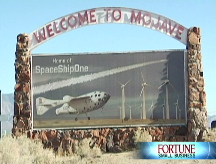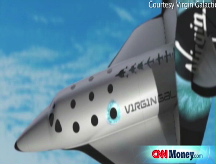Rocket Town U.S.A.
Forget NASA. The real future of America's space program may well lie in a thriving desert town of entrepreneurs who aim at the stars.
MOJAVE, CALIF. (Fortune Small Business) -- Outside Hangar 7, the desert and sky stretch as far as you can see, broken only by the distant Tehachapi Mountains and the occasional Joshua tree.
Inside the hangar the view is equally dramatic. A rocket, 30 feet long, lies on its side. Nearby sits a large capsule, looking like something out of the Apollo program. But this is the Neptune program - run not by NASA but by Roderick and Randa Milliron, a husband-and-wife rocketry company.
The Neptune sure looks convincing. But will it fly?
Welcome to Mojave, Calif., where "Will it fly?" is a constant question. The desert town is home to eight small rocket companies, twice the number of a decade ago. The town now boasts 4,000 residents, up from 2,700 five years ago, pursuing a galaxy of ambitious business models: space tourism, rocket-powered sports, and space-based experiments for corporations and scientists. Like any good business ecosystem, Mojave also has a growing cluster of companies that support the rocket firms: fabricators of exotic materials, parts suppliers, and even restaurants that cater to the space set.
Mojave can draw on a deep well of California aeronautics and engineering talent on the cheap. It is a 90-minute drive from Los Angeles, home to aerospace companies such as Lockheed Martin (LMT, Fortune 500), and five hours from San Francisco. The pay at rocketry startups such as the Millirons' can be as little as $16,500 a year. Yet these companies lure fresh hires with the promise of inspiring work and a bargain-basement cost of living.
On average a Mojave home goes for about $150,000, less than a third the average cost in L.A. Still, Mojave is clearly in the boonies. The town doesn't even have a movie theater.
"Here it's possible to test rockets in a very unpopulated area," says Mike Massee, a board member of the local chamber of commerce. "If something blows up, you're not going to take out an entire neighborhood."
The space race
Another draw is Mojave's 12,500-foot runway, longer than anything at Los Angeles International. During World War II, Mojave's airport was used to train Marine pilots. After the war it became a private airfield favored by owners of vintage biplanes and decommissioned fighter jets. In 2004, Mojave's airfield became the first inland facility to receive FAA approval for space traffic.
That same year saw the first small company reach space: Scaled Composites, then owned by Mojave entrepreneur and airplane designer Burt Rutan. His revolutionary SpaceShipOne became the first private craft to ascend 62 miles to the edge of suborbital space, twice over two weeks.
That netted him the $10 million Ansari X Prize, but even larger purses awaited. Last August, Northrop Grumman (NOC, Fortune 500) purchased Scaled Composites for an undisclosed sum. And Richard Branson commissioned Rutan to design and build the first batch of rockets for a space tourism business, Virgin Galactic.
This summer Rutan began testing SpaceShipTwo, which is twice the size of the original, in the nearby desert. Branson has taken $30 million in deposits from customers hoping to take a 2½-hour space flight. Virgin Galactic is hoping to launch in 2010, and has many would-be rivals.
"All the rocket pioneers in town want to be like Burt," says Bill Deaver, editor and publisher of the Mojave Desert News. "The stakes are big, the money is big, the glory is huge."
Most Mojave rocket startups, however, are still operating on a shoestring. Roderick and Randa Milliron, both 57, have been operating out of Hangar 7 since 1996. On a microscopic revenue stream ($150,000 in 2007) they've managed to keep their business going and in flush times have hired up to 25 employees.
To fund their dream, the Millirons seize any side project they can find. They consulted with the state of Texas about locating a spaceport like Mojave along the Gulf Coast. Hollywood studios have paid to record some of the engine tests that the Millirons have conducted out in the desert. Spaceship sound effects in movies such as War of the Worlds and Serenity are from their rocket engines.
"Rod and Randa are from another planet," says test pilot Dick Rutan, brother of Burt. "But nobody knows what's going to work. Lots of industries we now take for granted grew out of innovators trying things. We need a whole bunch of ideas - the weirder, the better."
The Neptune, powered in part by a proprietary fuel that the Millirons identify only as Hydrocarbon X, certainly fits that bill. The Millirons are currently seeking funding for a series of test flights of their 90-foot multistage rocket next year. In the long run they plan to offer full space vacations for as many as six people at a time. After a month of training, passengers would spend a week in orbit before the capsule parachutes into the ocean.
Such a ride does not come cheap: The Millirons plan to charge $2.5 million a ticket, although the first ten Neptune passengers will get promotional fares of $250,000. (A Virgin Galactic ticket is set to cost $200,000.)
"We're not interested in a short flight where you kiss the edge of space," says Randa. "We want our passengers to circle the earth, experience orbital sunrises and sunsets, and get a privileged perspective from 250 miles up."
-
The Cheesecake Factory created smaller portions to survive the downturn. Play
-
A breeder of award-winning marijuana seeds is following the money and heading to the U.S. More
-
Most small businesses die within five years, but Amish businesses have a survival rate north of 90%. More
-
The 10 most popular franchise brands over the past decade -- and their failure rates. More
-
These firms are the last left in America making iconic products now in their twilight. More














